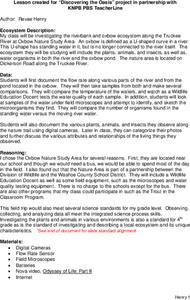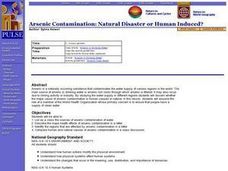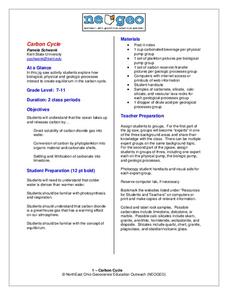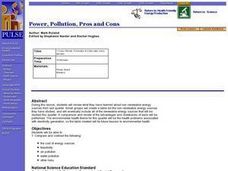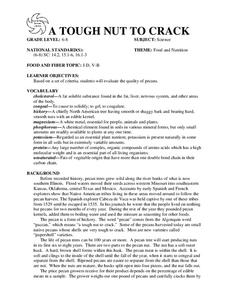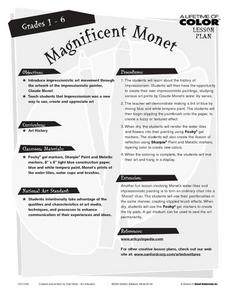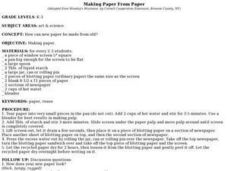Curated OER
Everyday vs. Extreme Relationships with Nature
Students examine the interactions with nature and the environment. They discover where water comes from and ways to conserve water. They also examine energy sources and consumption.
Curated OER
Happy the Fish
Students explore the ways in which people's actions affect fish. They discuss pollutants that are in the water. Students define the terms chemicals, cooling pond, and pollutant. They create a book about Happy the Fish.
Curated OER
Discovering the Oasis
Fourth graders investigate riverbanks and oxbox ecosystem at the Truckee River. They observe the plants, animals, insects and water organisms located there. Students document water samples, flow and then categorize them in class. This...
Curated OER
Arsenic Contamination: Natural Disaster or Human Induced?
Young scholars list as a class the sources of arsenic contamination of water. They describe the major health effects of arsenic contamination in a letter. Students identify the regions that are affected by it.
Curated OER
Amphipods
Students identify organisms that live at the bottom of the body of water. In this biology lesson, students evaluate the effects of pollution to amphipods population. They examine collected data and create a bar graph comparing them.
NorthEast Ohio Geoscience Education Outreach
Carbon Cycle
Using a jigsaw approach, earth science experts teach each other about the physical, biological, and geologic components of the carbon cycle, with a specific focus on the ocean.
Kenan Fellows
Determining Stream Health by the Diversity and Types of Benthic Organisms
How diverse are the benthic organisms found in local streams? Using the information learned in previous lessons on identification of macroinvertebrates and on calculating stream index values, groups determine the health of local...
Curated OER
Exploration Watershed
Students discuss what a watershed is, and locate watersheds on a map. In this watershed lesson, students use the information they have been introduced to and create a color coded watershed map of their own.
Curated OER
Know Your Watershed
Students investigate the importance and the location of their own watershed by visiting and EPA website and also work in groups to create an action plan on how to protect their local watershed.
Curated OER
Power, Pollution, Pros and Cons
Students review what they know about non-renewable energy, compare and contrast advantages and drawbacks of each type, such as cost of energy sources, feasibility, air pollution, water pollution, and other risks, and create table listing...
Curated OER
Acid Rain
Students investigate the quality of water using a variety of methods. They use a pH probe to measure the pH and study the effect of dissolved CO2 in the water. Students also observe the effect of the pH upon the dissolving of H2SO4 in...
Curated OER
Building a Healthy City (Final Project)
Students construct a scaled model of a city that provides for the economic and cultural needs of a community while maintaining high quality air and water to protect the public health. They articulate, in a presentation, the locations of...
Curated OER
Groundwater Pump Test
Students observe groundwater flowing to a pump, changes in groundwater table as a result of pumping, and the quantity and quality of water in the groundwater system. Students must graph and interpret their data, and quantify orders of...
Curated OER
Endangered Species- Florida Panther
Students investigate the concept of the conservation of the Florida Panther and examine the effects of the Everglades water restoration project. They conduct a web based activity that includes the following: Listing what they know,...
Curated OER
A TOUGH NUT TO CRACK
Based on a set of criteria, students will evaluate the quality of pecans.1. Bring a gram scale and papershell pecans. Provide five pecans for each student. 2. Divide the class into groups of five and provide each member with five pecans....
Curated OER
All That Glitters...
Students study that white light (visible light) is comprised of all colors of the spectrum. They study that the quantity of light decreases with increasing depth in the ocean. They study that the quality of light changes with increasing...
Curated OER
Magnificent Monet
Learners research the water lily paintings of Claude Monet and the impressionistic art period. They create their own impressionistic art works and display them in the classroom.
Curated OER
Wright Brothers Centennial: North Carolina, Creation and Development of the State
Eighth graders examine technological advances and how they influenced the quality of life in North Carolina. Using maps, they locate the city of Kitty Hawk and discuss why it was chosen for the first flight. They read primary source...
Curated OER
The Pros and Cons of Dams
Students investigate the use of dams on rivers in order to manage water uses in particular the Flathead River and Lake. They make presentations about dam management and write a persuasive paper on the issue. If possible they visit the...
Curated OER
MAKING PAPER FROM PAPER
Pupils tear paper into very small pieces and follow a formula to make recycled paper. They follow up with a discussion about the quality of their paper and its benefits.
Curated OER
It's All About Power
Students explore the legislative process by discussing a current issue dealing with energy policy. They explain the role of government and how it affects their quality of life. Students identify and list the groups that create energy...
Curated OER
Using Technology To Learn Independently
Students explore learning strategies that may be incorporated into a classroom. In groups, they prepare a role play that demonstrates a specific learning strategy. students discuss necessary materials,l take notes on the learning...
Curated OER
Investigation of Timbre
Pupils design an experiment to analyze the timbre of different instruments. In this physics lesson, students analyze the missing quality in sound. They discuss their results in class.
Curated OER
What is the Problem of Boston Harbor?
Students recognize the affects of technology on the environment. They examine data to determine methods to improve waater quality. A research paper is written to desribe recommendations for improving water in the future.


